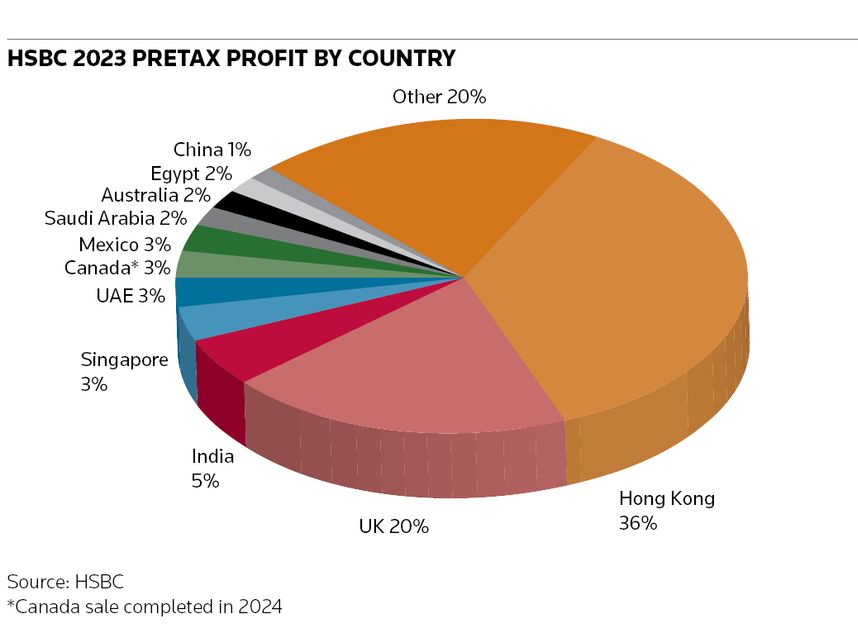Emperor Diocletian stabilised the Roman Empire by dividing it into two. The Eastern Empire and Western Empire grew apart over time and while the west declined precipitously, the east survived – and mostly thrived – for another thousand years. Will HSBC CEO Georges Elhedery, who announced a strategy revamp last week, turn out to be a modern-day banking Diocletian?
Let’s step back a moment and recall what we know – which is not much. HSBC is splitting into four divisions: a merged global markets and banking business and international commercial banking; international wealth management and premier banking; Hong Kong retail and SME banking; and UK retail and SME banking. The group will also be split into eastern and western regions – centred not on Rome and Byzantium, but on London and Hong Kong (although the eastern region also contains the Middle East business).
The delayering of management and reduction of duplicated infrastructure in global and commercial banking is a sensible move. JP Morgan recently merged its investment and commercial banks – and they seem to know what they’re doing. Although few financial details were provided, the move will presumably generate annual savings of few hundred million US dollars. Not to be sniffed at, but in the grand scheme of things a rounding error for a bank as large as HSBC that last year generated profit before tax of US$30bn.
Combining UK retail and commercial banking – both already in the ring-fenced UK entity – and creating a completely new division bringing together Hong Kong retail and commercial banking also seems sensible, although there will surely be some additional annual running costs.
But looking at HSBC’s new corporate structure through a purely financial lens is probably not seeing the wood for the trees.
The bank is quick to say that this plan is very different to the changes that its major shareholder, Ping An, demanded two years ago. But is it really? Ping An wanted the bank to split off its Asian operations. So it’s certainly a step in that direction – or at least enables one to be taken.
The proposed new corporate structure is likely to have played a big part in Elhedery’s audition for the CEO job with the HSBC board – in which he had to address Western and Chinese shareholders. Does it solve HSBC’s long-term geopolitical dilemma of balancing a split between two blocs – Europe and the US on one side and China on the other – as they move into a more antagonistic relationship? No, but it does give HSBC optionality to move quickly to break up the group if US-China relations deteriorate dramatically – or Chinese authorities do something drastic, like invade Taiwan.
On a more mundane level – but potentially just as important – HSBC’s structural business issues remain. It is less sensitive to lower interest rates in the short term given Elhedery used his insight as a rates trader to put in place structural hedges while he was CFO.
But hedges roll off, and HSBC hasn’t suddenly transformed itself into a fee-generating giant. So there’s a big challenge of where structural growth comes from.
The new focus reminds us how profitable the Hong Kong business is. It is a huge cash cow but cannot get any more dominant and is exposed to sharp cuts in interest rates. The UK business is not as lucrative and is losing out, like its high street rivals, to new digital banks but is nonetheless a nicely profitable operation. Transaction banking is a crown jewel, and one that HSBC’s closest peer Citigroup has been quick to highlight, although like Citi, it has been reliant on rising interest rates in recent years rather than significant customer expansion, and that is going into reverse.
HSBC is not facing the same instability as the Roman Empire did in the third and fourth centuries. It generated a 17% return on tangible equity in the first half of 2024 and has returned around US$50bn to shareholders since 2019 in the form of share buybacks and dividends.
Nonetheless, a breakup may eventually be necessary, not just for the eastern empire to thrive but for the other parts of the business to scale up. An IPO of the Hong Kong business should be easier when it is already a separate division and, by owning a large shareholding, HSBC could ensure cross-border commercial banking synergies remain intact while still being able to tell its Western and Chinese shareholders that it is two separate banks.
It is distinctly possible that just as Rome's shift to an Eastern Empire and Western Empire was not just one event, HSBC's latest corporate structure is simply the first in a series of changes that lead to a radically different bank.
Rupak Ghose is a former financials research analyst







